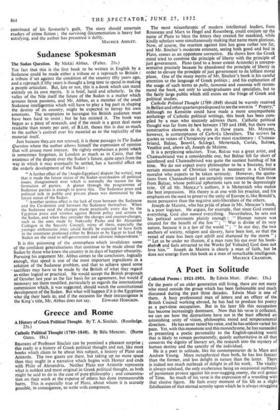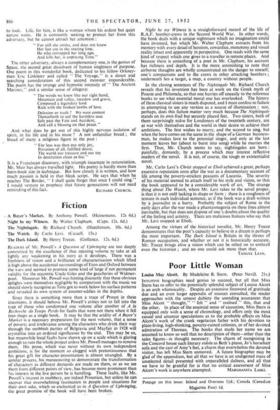A Poet in Solitude
Collected Poems : 1921-1951. By Edwin Muir. (Faber. 15s.)
OF the poets of an older generation still living, there are not many who stand outside the group which has been fashionable and much discussed during the past three decades. Edwin Muir is one of them. A busy professional man of letters and an officer of the British Council working abroad, he has had to produce his poetry as a part-time occupation. But in his later life this occupation has become increasingly dominant. Now that his verse is collected, we can see how the distractions have not in the least affected an astonishing unity of vision, philosophic mood and temperamental direction. He has never raised his voice, and he has seldom varied his pace. Yet, with this monotone and this monochrome, he has succeeded in presenting a poetic personality to the English-speaking world that is likely to remain permanently, quietly authoritative in all that concerns the dignity of literary art, the research into the mystery of human destiny and the sanctity of the individual.
He is a poet in solitude, like his contemporaries de la Mare and Andrew Young. More metaphysical than both, he has less fantasy than the former, and less delight in nature than the latter. There is indeed not much outbreak of delight in all his work. The vitality is always subdued, the only exuberance being an occasional outbreak of passionate protest against his ever-nagging enemy, the evil genius of Time. So much of his verse is the expression .of a wrestling with that elusive figure. He feels every moment of his life as a slight falsification of that eternal serenity upon which he is always struggling
to look. Life, for him: is like a woman whom his ardent but quiet nature woos. He is constantly seeking to protect her from this adversary, but he cannot attract her attention : " For still she smiles, and does not know Her feet are in the snaring lime. He who entrapped her long ago, And kills her, is unpitying Time."
The other adversary, always a complementary one, is the genius of Space, the second great dissolvent of human singleness of purpose. One poem in this wonderful book, dedicated to his fellow Orkney- man Eric Linklater and called " The Voyage," is a direct and searching consideration of this second monster imponderable. The poem has the strange and hypnotic intensity of " The Ancient Mariner," and a similar sense of allegory: " The words we knew like our right hand, Mountain and valley, meadow and grove, Composed a legendary land Rich with the broken tombs of love.
Delusion or truth ? We were content Thenceforth to sail the harmless seas Safe past the Fate and Accident, And call a blessing on that peace."
And what does he get out of this highly nervous isolation of spirit, in his life and in his muse ? A not unfamiliar bread ; the bread of many a religious figure in the past : " For loss was then our only joy, Privation of all, fulfilled desire, The world our treasure and our toy In destitution clean as fire."
It is a Franciscan discovery, with triumph incarnate in renunciation. Mr. Muir has always travelled light. His poetry is hardly more than horn-book size in technique. But how closely it is written, and how much passion is held in that bleak script. He says that when he reaches The Border, " I shall quite forget that once I could sing." I would venture to prophesy that future generations will not need



































 Previous page
Previous page